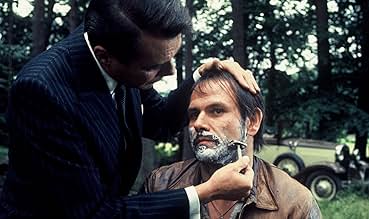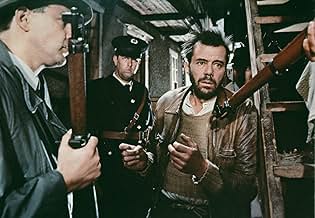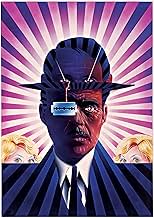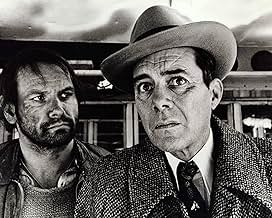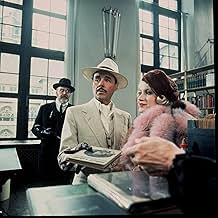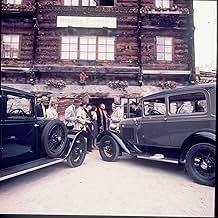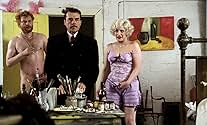Un fabricante de chocolates, hastiado de su existencia, intercambia su identidad con un vagabundo, convencido de que es su doble.Un fabricante de chocolates, hastiado de su existencia, intercambia su identidad con un vagabundo, convencido de que es su doble.Un fabricante de chocolates, hastiado de su existencia, intercambia su identidad con un vagabundo, convencido de que es su doble.
- Dirección
- Guionistas
- Elenco
- Premios
- 3 premios ganados y 1 nominación en total
- Innkeeper
- (sin créditos)
- Dirección
- Guionistas
- Todo el elenco y el equipo
- Producción, taquilla y más en IMDbPro
Opiniones destacadas
I love the mystery of this film. It really is a puzzle of a film and sweeps us along on it's gorgeous journey. Twist follows turn and back again.
The whole cast are perfect with Dirk Bogarde being perfect as Hermann. The screenplay is brilliantly adopted from a Nabokov novel by Tom Stoppard with snappy and wicked dialogue that positively crackles.
The look of the film is muted and also beautiful because of it. It lends massively to why the film works so well as it's visually and uniformly a treat for the eyes. Enjoy the ride which will keep you guessing until the final frame.
Given this, Fassbinder instead focused on his strengths: getting wonderful Douglas Sirk-like melodramatic performances from his actors, and going for the emotional jugular. Parts of "Despair" are surprisingly light and even comical, but these serve to set up the subsequent tragic tone and histrionic intensity.
Like his later "Berlin Alexanderplatz", Fassbinder exaggerates several aspects of his source novels. He queer-ifies the story, making clearer the ambiguously gay dimensions of the narrative -- "Despair" becomes a tale of homosexual paranoia. Fassbinder also places the narrative firmly in its historical moment: it's emphasized that the protagonist is half-Jewish, and this becomes an occasion to explore not only racial paranoia, but the specific events and cultural attitudes that existed in Germany as the Nazis rose to power.
But most of all, "Despair" and "Alexanderplatz" are studies of characters who psychologically disintegrate and descend into madness. Fassbinder is cinema's great poet of the manic episode and the psychotic break. Dirk Bogarde is masterful as Hermann Hermann, a man consumed by discontent and partly-justified paranoia, whose obsessions drive him into progressively stranger behavior. Like many of Fassbinder's mentally ill protagonists, Hermann is both likeable and capable of awful things; the viewer sympathizes as he loses touch with reality and his world crumbles.
Strong recommendation for Dirk Bogarde's stellar performance as Hermann Hermann, and for Fassbinder's fearless dialogue with madness and tragedy.
Vladimir Nabokov wrote his novel "Despair" as a spoof of Dostoyevsky's "Crime and Punishment." The script includes lines referring to Dostoyevsky and Arthur Conan Doyle. "Despair" the film falls short of achieving/adapting the greatness of Dostoevsky or Conan Doyle. It is possibly because for Nabokov and Fassbinder the mental state of Herman (Bogarde) is paramount than the tale itself.
The audience struggles to come to terms with a clean shaven Herman suddenly sporting an elegant moustache in between sequences. If it was a fake moustache, the audience is not prepared for it by Fassbinder. Or were scenes edited out in the final cut?
Fassbinder was evidently quite familiar with Nabokov. Nabokov wrote Lolita with a lead character named Humbert Humbert. Fassbinder extrapolates the idea in "Despair" (or was it Stoppard?) by calling the lead character in "Despair" Herman Hermann, when Nabokov called him just Herman.
If there was one outstanding aspect in this film it was cinematographer Michael Ballhaus working with mirrors and glass panes in doors. One great shot, creditable to Fassbinder and Ballhaus, was of two Jews continuing to play chess at the street cafe as a Jewish shop is attacked by Nazis followed much later in the film by a distinctly similar shot of the same Jewish duo playing chess with non-distinctive clothes.
Another important aspect of the film is Fassbinder 's dedication of this quaint work to three mentally unstable geniuses: Antonin Artaud (the actor/playwright who introduced The Theatre of Cruelty) , Vincent Van Gogh (the painter who cut off his ear) and Unica Zurn (a painter famous for her paintings of torsos bound with string). And lastly several actors in this film and those supposed to play originally in the film were openly gay as was the director..
¿Sabías que…?
- TriviaThis movie cost more than all of Director Rainer Werner Fassbinder's previous movies combined.
- ErroresThough the movie is set in Weimar Germany in the early 1930s, at 1:15:15, Hermann Hermann smokes a filtered cigarette, and those were put on the market in the 1950s.
- Citas
Lydia: What's that accident all about?
Herman: What accident?
Lydia: In America. Why should it matter to you?
Herman: It doesn't say anything about an accident... it says just to go crash. Collapse!
Lydia: The whole street collapsed?
Herman: Wall Street.
Lydia: Were people killed?
Herman: Just a few. Mostly jumping out of windows. Nearly all of them were stock holders.
Lydia: Oh, Hermann...
Herman: Really, you are such a... such a stupid woman, Lydia. You've lived here for 7 years already and you still can't speak the language properly. Still, I don't mind. Inteligence would take the bloom off your carnality. No, a woman like you should keep moist and plump.
- ConexionesFeatured in Dirk Bogarde: By Myself (1992)
Selecciones populares
- How long is Despair?Con tecnología de Alexa
Detalles
Taquilla
- Presupuesto
- DEM 6,000,000 (estimado)
- Total en EE. UU. y Canadá
- USD 8,144
- Fin de semana de estreno en EE. UU. y Canadá
- USD 11,623
- 16 feb 2003
- Total a nivel mundial
- USD 8,148
- Tiempo de ejecución1 hora 59 minutos
- Mezcla de sonido
- Relación de aspecto
- 1.66 : 1
Contribuir a esta página



